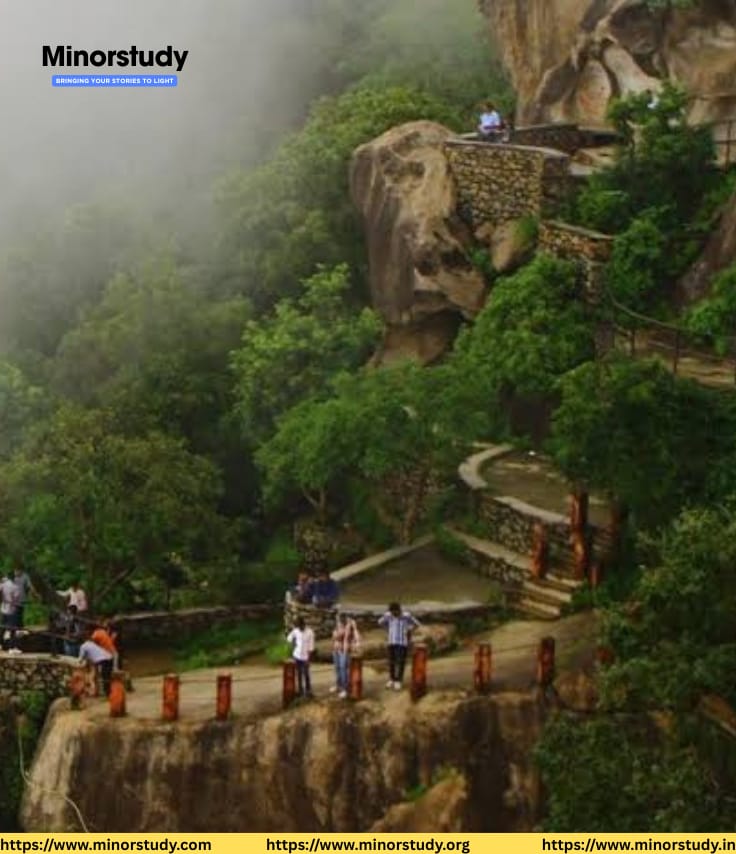🌟 Introduction: Rajasthan’s Only Hill Station With a Soul
Amidst the golden sands and scorching heat of Rajasthan lies a surprising emerald oasis — Mount Abu, the only hill station of Rajasthan. Perched at 1,220 meters above sea level on the Aravalli Range, Mount Abu is a breathtaking escape packed with spirituality, cool breezes, ancient temples, British-era heritage, and panoramic lakes.
- 📜 History of Mount Abu
- 🗓️ Timeline of Mount Abu
- 🔥 7 Magical Facts About Mount Abu
- 🙋 Frequently Asked Questions (FAQs)
- ❓ Why is Mount Abu famous?
- ❓ Is Mount Abu suitable for a summer vacation?
- ❓ How to reach Mount Abu?
- ❓ What is the best time to visit?
- 🪔 Significance & Observances
- 💌 Heartfelt Wishing
- 📌 Important Takeaways
- 🌍 Daily Life Impact
- 👨👩👧👦 1. Spiritual Wellness
- 🏞️ 2. Environmental Awareness
- 🧘 3. Personal Rejuvenation
- 💼 4. Employment & Local Economy
- 🏛️ Significance in Society
- 📖 Conclusion: The Soul of the Desert Hills
For centuries, it has been a melting pot of cultures, beliefs, and natural wonders, drawing in sages, saints, kings, colonists, and now modern tourists. Mount Abu is not just a hill station — it’s an experience that soothes the spirit, educates the mind, and rejuvenates the body.
📜 History of Mount Abu
Mount Abu’s name is derived from “Arbuda”, a mythical serpent who saved Nandi, the sacred bull of Lord Shiva, according to ancient Hindu mythology.
🕉️ Mythological Significance
Mentioned in the Puranas as the retreat of sages and saints.
Believed to be the place where the great sage Vashistha performed a yagna to create the four Agnivanshi Rajput clans: Parmar, Chauhan, Solanki, and Pratihara.
🏛️ Historical Importance
During the Gupta period, it served as a center of learning and spirituality.
Later, it came under Chaulukya and Parmar dynasties, both of which built majestic temples.
Under British rule, it was a summer retreat for the Rajputana kings and British officers — hence the colonial-era bungalows and administrative buildings.
🗓️ Timeline of Mount Abu
| Period | Event |
|---|---|
| Ancient Period | Associated with Sage Vashistha and Lord Shiva |
| 11th–13th Century | Dilwara Temples built by Solanki rulers |
| 14th Century | Under Rajput control; sacred Jain and Hindu center |
| 1819 CE | Comes under British East India Company rule |
| 20th Century | Becomes a tourist destination and headquarters of Brahma Kumaris |
| Today | A UNESCO-nominated site known for spirituality and ecology |
🔥 7 Magical Facts About Mount Abu
🏯 Dilwara Temples are globally celebrated Jain marble temples — considered the finest in India, with unmatched architectural detail.
🌅 Nakki Lake, believed to be dug by gods with nails, is one of the most peaceful and scenic water bodies in the region.
🧘 Mount Abu is the headquarters of Brahma Kumaris, a major spiritual organization with a global presence.
🧗 The Guru Shikhar peak, at 1,722 meters, is the highest point of the Aravalli Range.
🐾 Mount Abu Wildlife Sanctuary shelters rare species like the Indian leopard, sloth bear, and over 250 bird species.
🕉️ Achaleshwar Mahadev Temple is built around a toe impression of Lord Shiva.
🌄 The climate is so unique that it’s referred to as the “Shimla of Rajasthan”, offering cool air in the desert state.
🙋 Frequently Asked Questions (FAQs)
❓ Why is Mount Abu famous?
Mount Abu is known for:
Dilwara Jain Temples
Nakki Lake
Guru Shikhar Peak
Brahma Kumaris headquarters
Hindu mythology and Rajput history
❓ Is Mount Abu suitable for a summer vacation?
Absolutely! It’s the coolest retreat in Rajasthan, with temperatures between 20°C and 30°C in summer — a perfect getaway from the heat.
❓ How to reach Mount Abu?
By Road: Connected to major cities via NH27
By Train: Nearest station is Abu Road (28 km)
By Air: Closest airport is Udaipur (165 km)
❓ What is the best time to visit?
October to March is ideal for spiritual tourism and sightseeing. Monsoon (July–September) turns it lush and green.
🪔 Significance & Observances
Mount Abu is deeply spiritual — a convergence of Hinduism, Jainism, and global spiritualism.
🔱 Major Observances
| Event | Description |
|---|---|
| Mahavir Jayanti | Celebrated grandly at Dilwara Temples by Jain devotees |
| Paryushan Parva | Annual Jain festival; observed with fasting and prayers |
| Guru Purnima | Celebrated at various ashrams and temples including Brahma Kumaris HQ |
| Winter Festival | Cultural fest with music, dances, boat races, and fireworks on Nakki Lake |
💌 Heartfelt Wishing
🌼 May your journey to Mount Abu bring spiritual clarity, natural wonder, and emotional peace. May the serene lakes, ancient temples, and cool mountain air bless your life with stillness, joy, and discovery. 🕊️
📌 Important Takeaways
🔹 Rajasthan’s only hill station, full of lush greenery and spiritual sites
🔹 Perfect blend of Jain, Hindu, and global spiritual cultures
🔹 Home to some of the world’s most detailed marble architecture
🔹 A biodiversity hotspot and a great retreat for ecotourism
🌍 Daily Life Impact
Mount Abu affects not only the tourists but also daily life across Rajasthan and India in the following ways:
👨👩👧👦 1. Spiritual Wellness
As home to Brahma Kumaris, it influences millions seeking peace, yoga, and meditation.
🏞️ 2. Environmental Awareness
The wildlife sanctuary and lakes highlight conservation importance in arid zones.
🧘 3. Personal Rejuvenation
Urban tourists find Mount Abu as a place for detoxing, retreating, and inner work.
💼 4. Employment & Local Economy
Boosts tourism-based livelihoods — hotels, transport, guides, and local artisans thrive.
🏛️ Significance in Society
Mount Abu is more than a destination — it’s a symbol of balance:
💠 Balance between spirituality and leisure
🌍 A cross-cultural spiritual hub attracting tourists from across the globe
🛕 A repository of Indian religious architecture, from Jain to Shaivism
🪷 Home to peace-promoting institutions like Brahma Kumaris influencing global dialogues on peace and non-violence
📖 Conclusion: The Soul of the Desert Hills
Mount Abu reminds us that even in a desert, life, beauty, and peace can flourish. It’s a mountain that speaks — not loudly but gently — telling tales of gods, sages, kings, artists, and seekers. It’s a reminder that nature and spirit can thrive even in the harshest landscapes.
So whether you’re escaping the heat, chasing serenity, or exploring the sacred — Mount Abu welcomes you with both cool winds and a warm heart.









Very interesting topic, thanks for putting up. “Nobody outside of a baby carriage or a judge’s chamber believes in an unprejudiced point of view.” by Lillian Hellman.